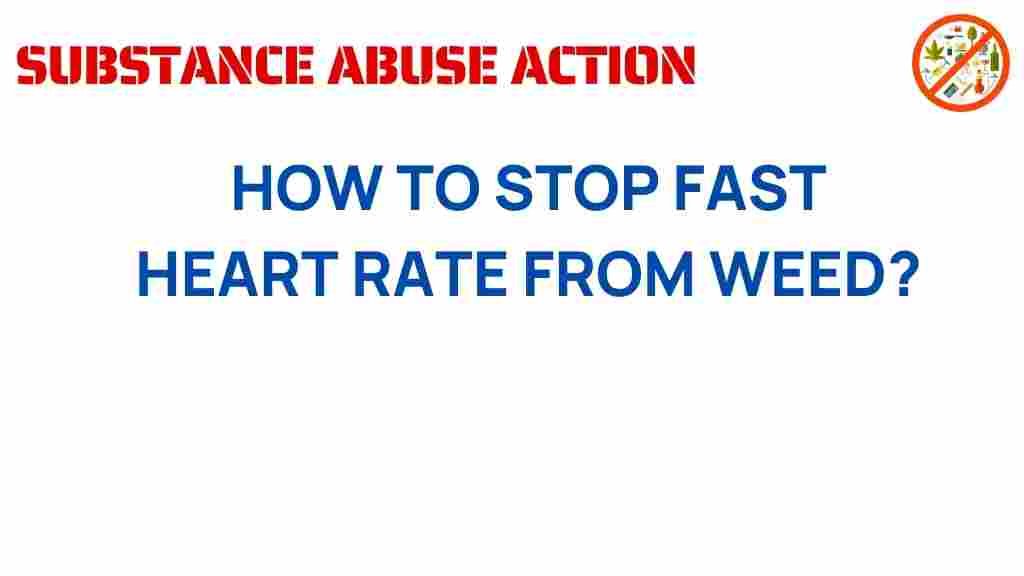Unraveling the Mystery: How to Stop Fast Heart Rate from Weed
The use of cannabis has become increasingly popular for various therapeutic and recreational purposes. However, many users experience fast heart rate as a side effect, particularly when consuming certain strains or products. Understanding the relationship between cannabis effects, anxiety, and heart health is crucial for those looking to enjoy the benefits of cannabis while minimizing adverse reactions. In this article, we will explore the connection between cannabis and fast heart rate, discuss prevention and treatment strategies, and provide wellness tips for recovery.
Understanding Fast Heart Rate and Cannabis Effects
Fast heart rate, or tachycardia, can be a concerning symptom for cannabis users. This phenomenon is often linked to the psychoactive compound THC (tetrahydrocannabinol), which can lead to increased heart rate and feelings of anxiety. The body’s response to THC varies significantly among individuals, influenced by factors such as dosage, strain type, and personal health conditions.
Here’s a closer look at how cannabis affects heart rate:
- THC and Heart Rate: THC can stimulate the sympathetic nervous system, which often causes an increase in heart rate.
- Anxiety and Panic Attacks: For some users, cannabis can trigger anxiety or panic attacks, which may further elevate the heart rate.
- Strain Variations: Different strains of cannabis have varying levels of THC and CBD (cannabidiol), which can affect heart health differently.
The Link Between Anxiety and Fast Heart Rate
Anxiety is a common trigger for fast heart rate. When consuming cannabis, individuals who are predisposed to anxiety may find their symptoms exacerbated. This can lead to a cycle where the fast heart rate increases anxiety, which in turn can further elevate heart rate.
Recognizing the signs of anxiety related to cannabis use is essential for effective management:
- Increased heart rate
- Persistent worry or fear
- Restlessness and agitation
- Difficulty concentrating
- Physical symptoms such as sweating or trembling
Factors Influencing Fast Heart Rate from Cannabis
Several factors can influence the likelihood of experiencing a fast heart rate when using cannabis:
- Dosage: Higher doses of THC are more likely to induce fast heart rate.
- Method of Consumption: Smoking or vaping may lead to quicker onset of effects compared to edibles.
- Individual Tolerance: Regular users may develop a tolerance that mitigates this effect.
- Pre-existing Conditions: Individuals with heart conditions or anxiety disorders may be more susceptible.
Step-by-Step Process to Manage Fast Heart Rate from Cannabis
If you experience a fast heart rate after consuming cannabis, follow these steps to help manage your symptoms:
1. Stay Calm and Breathe
When you notice an increase in your heart rate, try to remain calm. Deep breathing exercises can help:
- Inhale slowly through your nose for a count of four.
- Hold your breath for a count of four.
- Exhale slowly through your mouth for a count of four.
- Repeat this cycle until you feel more relaxed.
2. Hydrate
Drinking water can help your body recover and may alleviate some symptoms of anxiety. Staying hydrated is crucial for overall heart health.
3. Change Your Environment
Sometimes, being in a stimulating environment can heighten anxiety and fast heart rate. Consider moving to a quieter, more comfortable space to help you relax.
4. Use CBD
CBD is known for its calming properties and may counteract some of the anxiety and heart rate increases caused by THC. Consider using a CBD oil or product to help balance the effects.
5. Engage in Light Physical Activity
Gentle physical activity, such as walking or stretching, can help dissipate anxiety and regulate heart rate. Be sure to listen to your body and avoid overexertion.
6. Seek Support
If you’re feeling overwhelmed, reach out to a friend or loved one who can provide reassurance and support. Sometimes, talking about your experience can be therapeutic.
Troubleshooting Tips for Fast Heart Rate from Cannabis
If you frequently experience fast heart rate while using cannabis, consider these troubleshooting tips:
1. Adjust Your Dosage
Experiment with lower doses of THC to see if this helps reduce heart rate and anxiety. Starting with small amounts can often prevent overwhelming effects.
2. Choose the Right Strain
Different cannabis strains have varying effects on heart rate and anxiety levels. Strains high in CBD and lower in THC may be more suitable for those sensitive to fast heart rate.
3. Avoid Combining Substances
Combining cannabis with other substances, especially stimulants like caffeine or nicotine, can exacerbate fast heart rate and anxiety. It’s best to avoid these combinations.
4. Monitor Your Heart Health
Regular check-ups with a healthcare provider can help monitor your heart health, especially if you have pre-existing conditions. Discuss your cannabis use and any symptoms you experience.
5. Practice Mindfulness and Relaxation Techniques
Incorporating mindfulness practices, such as meditation and yoga, into your routine can help manage anxiety and promote heart health. These techniques can be effective in preventing fast heart rate.
Conclusion: Finding Balance in Cannabis Use
While cannabis can provide various health benefits, it’s essential to be mindful of its effects on heart rate and anxiety. Understanding the connection between fast heart rate, cannabis effects, and heart health is crucial for responsible use. By following the steps outlined in this article, you can mitigate the risks associated with cannabis consumption and promote overall wellness.
Remember, individual reactions to cannabis can vary widely. If you continue to experience fast heart rate or other concerning symptoms, consider consulting a healthcare professional for personalized advice and treatment options.
For more information on cannabis and wellness, check out this resource on cannabis safety. If you’re looking for additional support, consider reaching out to healthcare professionals who specialize in cannabis-related health issues.
This article is in the category Health and created by SubstanceAbuseAction Team
